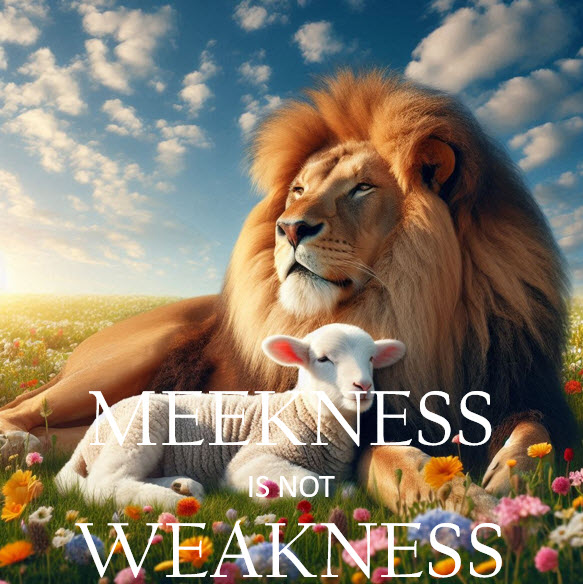In a world where assertively “standing up for yourself” is often lauded and the loudest voices receive the most attention, the virtue of meekness is frequently misunderstood and undervalued. However, the words of the Sermon on the Mount, “Blessed are the meek, for they shall inherit the earth,” invite us to reconsider the true nature and importance of meekness. Far from being a sign of weakness, genuine meekness is a profound strength that requires humility, open-mindedness, and selfless regard for others.
True Meekness: Strength, Not Weakness
At first glance, meekness may appear to be synonymous with timidity or passivity. However, nothing could be further from the truth. True meekness is a strength of character that involves self-control and a deep understanding of one’s own limitations. It is the ability to remain calm and composed in the face of adversity, to respond with gentleness rather than aggression, and to prioritize the happiness of others over one’s own ego and feelings. This inner strength is not born out of fear or insecurity but from a place of confidence and inner peace.
Meekness requires a high degree of self-awareness and self-discipline. It is a conscious choice to rise above our base instincts and to act with grace and kindness, even when provoked. This strength is often mistaken for weakness by those who equate power with dominance and assertiveness. However, the true power of meekness lies in its ability to transform conflict into harmony and to build bridges where others might see only barriers.
Humility and Open-Mindedness
At the heart of meekness is humility. To be meek is to recognize that none of us have all the answers, and that our perspective, our “truth”, is not inherently superior to others. It is to approach life with a sense of curiosity and a willingness to learn from every experience and every person we encounter. This humility allows us to be open-minded and receptive to new ideas, to listen more than we speak, to value the perspectives of others, and to seek truth while remembering that we all see that elephant, not only from different vantage points, but always “thorough a glass darkly”.
Humility also involves acknowledging our own flaws and limitations. It requires us to take responsibility for our actions and to seek forgiveness when we have wronged others. This honesty and vulnerability can be challenging, but it is essential for personal growth and for building authentic relationships.
Meekness, therefore, is not a passive surrender but an active engagement with the world in a spirit of humility and openness. It is the strength to admit when we are wrong, to change our minds when presented with new evidence, remaining flexible and adaptable in the face of change.
Coherence and Health
Meekness is also a core requirement for living a coherent stress-free life. When we embrace meekness, we open ourselves new perspectives and more realistic expectations. And this new realignment, or coherence, then reduces the internal and external conflicts that often lead to stress. By cultivating meekness, we can approach life with a sense of calm and acceptance, knowing that our emotional security is not determined by our ability to control others but by our capacity for kindness and empathy.
Stress-free living is one of the most important ingredients for a long, healthy, and happy life. Chronic stress is a major contributor to a wide range of health problems, from heart disease to mental health disorders. By reducing stress through the practice of meekness, we can improve our overall well-being and increase our chances of living a long and fulfilling life. This also includes maintaining a healthy mouth, as stress is also known to affect oral health by contributing to conditions such as gum disease and teeth grinding (brusism).
Valuing Meekness in a Self-Centered World
Despite its many virtues, meekness is rarely valued or respected in contemporary society; or in ancient society for that matter. Most people are more concerned with standing up for themselves rather than standing up for others. They equate meekness with weakness and view it as a liability rather than an asset.
This cultural bias can make it challenging for us to embrace and embody meekness. It can be difficult to remain gentle and patient when others choose to “cancel” us, erect impenetrable “boundaries”, or worse in a misguided attempt to gain control of their own lives by controlling others. However, it is precisely in these moments that the true strength of meekness shines through.
By choosing to be meek, we challenge the prevailing norms and offer an alternative vision of what it means to be strong and successful. We demonstrate that true power lies not in dominating others but in lifting them up. We show that humility and kindness are not signs of weakness but of profound inner strength.
Cultivating Meekness
If you should happen to be convicted of a need to cultivate more meekness in your own life, here are a few things that will help.
- Mindfulness – Self awareness is the first step in any personal growth or improvement effort. And for that, regular mindfulness practices are indispensable.
- Modeling – “By beholding we become changed.” Moses was called the meekest man on earth, and Jesus could arguable be considered even meeker. Who do you know with a meek reputation? Immerse yourself in getting to know them better.
- Choice – Remember that your behavior is always a choice. You can always choose. The only question is whether you will be willing to pay the short-term cost to gain the long-term benefit of choosing meekness.
- Expectations – Don’t expect immediate appreciation. You will be misunderstood, at least at first. But expecting that will prevent the stress of expecting otherwise.
By taking these steps, you will not only enrich your own life and health, but also contribute to the creation of a more compassionate and just society.
For more help in optimizing your oral-systemic health, contact Dr. Peckham at 855-55DRLON (855-553-7566) or Lon@DrLonPeckham.com. You can also learn more at SmileMiracles.org and MaverickHealth.life.






